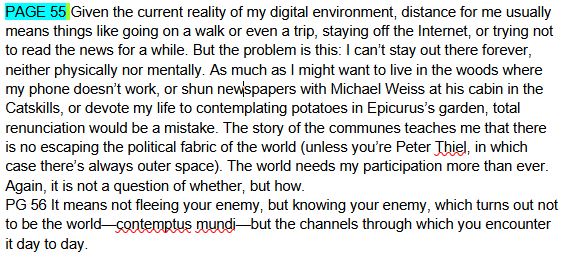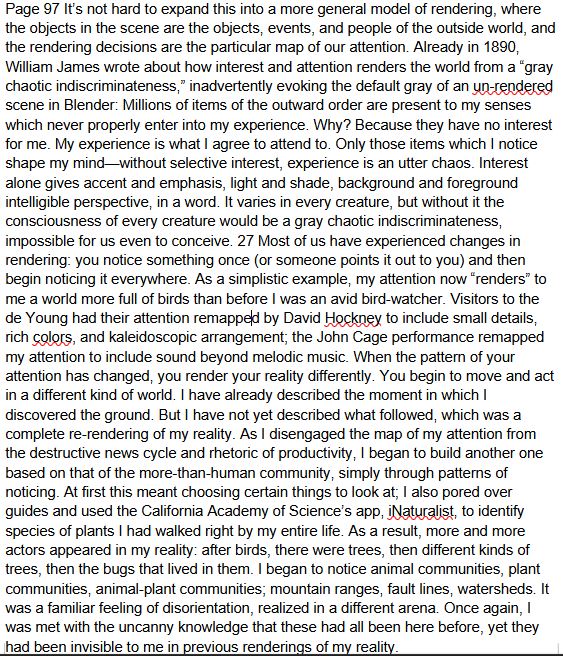| 'digital wellbeing' by google | | COMING SOON!!!!!!!! |
|---|
| how to do nothing: resisting the attention economy - jenny odell, 2019 | book | i really loved this book, particuarly the idea of rewiring your brain and the way it renders the world around it. she gives examples of this through personal experiences which is resonanted with and found quite beautiful especially regarding her experience in the rose garden, as i felt a complete shift in my connection and awareness to the world around me - a world id lived in for many years, but it had rendered as blurry and unfocused, that had rendered as clear and exciting and fruitful to me in 2022 after doing a lot of reduce my digital habits. it really speaks to ideas of how we should 'be' or 'exist' as humans and how simply managing our attention and allowing for more solitude, boredom, and nothing can let us inch closer back to something like how we are actually wired. 
heres some writings i liked to perhaps better explain






my only gripe with this book was the political bias and accusing only the 'far-right' of using tools like “someones old tweets and represent the ones that look the most offensive out of context”, when this is as equally as much by those on the 'left' and in fact, just about anyone at all as the intention with this is to further an agenda political or otherwise always. i found 'social warming' had this problem as well. another book i had to read digitally. i couldnt stand reading it on a computer again like i did with the shallows, so i downloaded it onto an old iphone to take with me on my commute. |
|---|
| james acasters guide to quitting social media - james acaster, 2022 | book | i dont know why i expected this to be a serious book considering its written by james acaster but it was nice to read something completely silly and absurd instead of the depressing feeling and intelectual challenges i got from most of the other books i read over the summmer lol, which acaster reveals himself* is the reason for writing this book - he was sick of all the boring questions he got from interviewers when he first left social media. probably wouldnt pick it up again. *as one commenter points out, why is graham in a hoodie and pillow fort? |
|---|
| social warming: how social media polarises us all - charles arthur, 2021 | book | this book does an excellent job of explaining the political polarisations that have occured as a result of algorthms on social media that indiscimantly boost content because algorthms dont have a moral or political bias - not just in the uk or us, but across the world too. i was particularly fascinated with the chapter on mynmar, illustrating how his concept of 'social warming' had occured in such a small timescale there and how they dont have a concept of social media - facebook IS their internet, and 'likes' were treated like a 'seen' metric (interestingly, this is the kind of method artists try to employ on social media when trying to play algorthims that will never bend to assist them). overall its a ery compelling argument as to why any kind of political discourse should be kept the fuck off of the internet and gives insight into WHY it is so intense and difficult. | |
|---|
| ten arguments for deleting your social media right now - jaron lainer, 2018 | book | a very succicnt and summarised book which id reccommend to beginners on the topic, as i found it repeated a lot of things i already thought or knew. i enjoyed the chapters on becoming an asshole, losing truth, losing empathy, and becoming unhappy, as they articulated reasons i hadnt quite been able to put together myself quite yet. |
|---|
| a world without email - cal newport, 2019 | book | i found this book very similar to one of his earlier works, deep work. though the contents of this book is very business and work life orientated i think many of the methods outlined in this book can be applied to daily life also, such as developing better boundaries with the internet when it comes to projects, and boundaries when it comes to the strange world of socialisation that happens online too. |
|---|
| the shallows: how the internet is changing the way we think, read, and research - nicholas carr, 2010 | book | i was reccommended this book by fellow neocities user bmh. carr excellently takes you through a history of how reading has developed throughout history alongside analysis of the way the brain functions to support focus and memory, and how reading on the internet is changing brain chemistry in a less than favourable way. ive always had a strange, unsettling, subconcious feeling in the back of my mind around technology that its so unnatural and we should get away from itand this book definately fueld those thoughts. i really reccommend it to anyone who cares about their focus and intelligence. this book was published in 2010, so i really am curious to know his perspective now, though its not hard to predict.
this was also the first book i read on a computer. 0/10 dont do it |
|---|
| the social dilema, 2020 | documentary | this documentary is excellent for scaring the shit out of your normie smartphone friends who've never even considered that social media could be a problem. but seriously, i think if you can get past the awful, awful, cringy and borderline out of touch fictional cut-scenes, this is a good starting point for introcuing yourself to many speakers who often come up when tapping into the topic of digital wellbeing (such as tristan harris and jaron lainer) and getting an understanding from people who've developed the technologies on smartphones and social media. |
|---|
| digital minimalism - cal newport, 2019 | book | mentioned countless times over this section of my site, this is one of the first books i managed to sit through after leaving social media.
much of this book is built on the findings of 1,600 of newport's readers who did his 30 day declutter, as newport himself has never had a social media account. i think the book provides an excellent framework and starting point for someone who is chronically online. i have a bad habit of taking things extremely literally, so i felt sour towards the concept of just '30 days' - but as newport mentions in his conclusion, 'adopting digital minimalism is not a onetime process that completes the day after your digital delutter; it instead requires ongoing adjustments. to me, the digital declutter is indefinate. using '30 days' meerly makes it appear more attainable, as writer fairyland explains is a similar sentiment towards her 'thousand day social media detox'. as with all of newports work, i appreciate how much research into other's lives, social groups, and into history that he does to support his pointers. |
|---|
